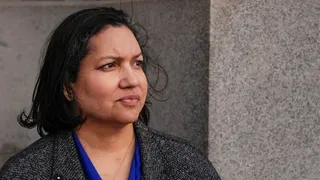May 23, 2012
Congressman Proposes Protecting LGBT Jurors From Discrimination
Jason St. Amand READ TIME: 2 MIN.
New Jersey Congressman Steve Rothman (D) has introduced a bill that would protect jurors against discrimination based on sexual orientation or gender identity.
The Juror Non-Discrimination Act of 2012 will prohibit potential jurors from being dismissed because they are part of the LGBT community.
"The fact that it is still lawful for lawyers to dismiss potential jurors solely on the basis of a person's sexual orientation or gender identity is wrong and has to change," said Rothman said in a statement.
"Until the 20th century, women in many states were barred from serving on juries and it was not until the 1980s that prosecutors were prohibited from systematically excluding African-Americans from juries. It is past time for America to take the next step against bigotry and inequality and pass the Juror Non-Discrimination Act."
In 2011, the U.S. Department of Justice told a panel of judges that it "takes no position" if the current law, which protects jurors from being removed from a jury based on race and sex, is extended to cover sexual orientation and gender identity.
The act of jury selection is known in Anglo-Saxon law as "voir dire" (Old French for "to tell the truth"). In most U.S. courts, prosecution and defense lawyers have a wide berth to dismiss at least a given number of potential jurors out of the jury pool without any justification.
In England, by contrast, the reason must be well established. 'Voir dire' has been the subject of considerable controversy in legal circles because of the sometimes extensive questioning of potential jurors by the two sides of the case.
When a San Diego judge learned that prosecutors dismissed a potential juror because he was gay, she ended up removing the entire jury panel, the Associated Press reported earlier this month.
Superior Court Judge Joan Weber said that the city attorney's office's decision was "shocking," and ruled that the defendants in the case were denied a fair jury.
The case in question occurred in August 2010 when nine people were arrested for protesting Prop. 8. The lawyers will now have to reselect the jury if the case goes to trial.
But prosecutors claim that the potential juror said that he protested in support of gay rights issues in the past, so they revoked his approval for a jury member.
"I've never had so many jurors express concerns about why a prosecutor's office would move forward and spend time and money on a case of this nature," Weber told the local media.
According to Lawyers.com jurors in a criminal trial "must remain impartial in deciding whether an accused individual, or defendant, is guilty or not guilty of any charged crimes."
The court and attorneys for the plaintiff and the defendant are allowed to ask a juror to be dismissed if they believe the juror is biased. For example, if the case involves a police officer and the potential juror works or is related to someone who works in law enforcement then they could be partial to the case.
But the dismissal can be challenged if it is believed the juror has been removed for a specific reason, such as race or sex.





